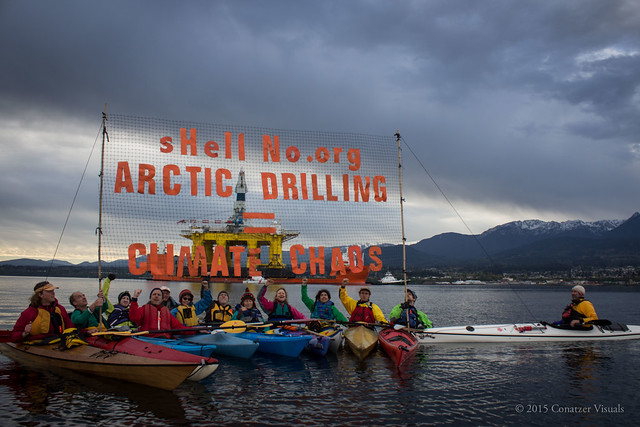Sometimes those who are creative and daring — those who paddle hard and bring enough friends — prevail in spite of cynics and detractors.
Published in the December 2015 issue of the New Internationalist.
In April, on the cold waters outside of Seattle, a swarm of one-person boats — a flotilla of paddlers in bright yellow, blue, lime green and red vessels — surrounded a massive oil rig.
These were the Kayaktivists, some 500 people in all. The towering platform they targeted, known as the ‘Polar Pioneer’, belonged to Royal Dutch Shell.
The monstrous ship was set to sail to the Chukchi Sea, off Alaska, to search for oil. The company’s plan, environmentalists argued, both endangered pristine habitat and held dire consequences for a planet already reeling from global warming.
Shell had hoped to use Seattle’s port as a longer-term launching pad for its Arctic drilling. But after the reception by the kayakers, the company sulked: ‘If Seattle doesn’t want us,’ said Shell vice-president Ann Pickard, ‘I think we need to think about where this business goes.’
Weeks later, a fresh phalanx of kayakers in Portland — joined by activists who rappelled off a bridge to block the passage of Shell’s 115-metre icebreaker, the MSV Fennica — further complicated the company’s exploration plans in the north.
In the wake of the actions, we heard familiar criticisms: slowing down a few ships won’t do anything. These were just misguided stunts.
Moreover, naysayers claimed, since the oil giant had already invested upwards of $7 billion, the wider #ShellNo campaign to stop Arctic drilling was doomed to failure.
That contention lasted until late September, when Shell suddenly announced that it would ‘cease further exploration activity in offshore Alaska for the foreseeable future’.
Denying the impact of activists, the company cited economics: the results of exploration had been ‘disappointing’, its spokespeople said. Analysts pointed to the low price of oil.
Yet the company also blamed ‘the challenging and unpredictable federal regulatory environment in offshore Alaska’. This atmosphere, of course, had been made challenging and unpredictable precisely because of outraged citizens.
The Houston Chronicle reported, ‘activism, both on the ground and in the courts, slowed Shell’s Arctic campaign, sometimes sidelining it for years at a time, and hiked costs, as the company paid for rigs, staff and other assets that couldn’t always be deployed. Conservation groups and Alaska Natives led legal challenges to the 2008 government auction of Chukchi Sea drilling rights… prompting a judge to twice invalidate the sale and forcing the firm to delay work.’
Under pressure from greens, Democratic presidential nominee Hillary Clinton expressed her opposition to Arctic drilling in August, casting a pall over Shell’s prospects of extracting whatever resources it might find.
The project became a pricier one than the company cared to shoulder.
In this context, Stuart Elliott, an analyst from energy information group Platts, told the BBC, ‘It is possible that Shell might almost be relieved as they can stop exploration for a legitimate operational reason, rather than being seen to bow to environmental pressure.’
Greenpeace UK executive director John Sauven did not bother equivocating: ‘Big oil has sustained an unmitigated defeat,’ he said.
A few weeks later the Obama administration finally acquiesced to activist demands and effectively cancelled leases for Arctic drilling for the remainder of the president’s term.
Meanwhile, the Canadian Globe and Mail reported that, as a result of an international fossil fuel divestment campaign — which pundits again assured us would be utterly useless — ‘investors managing some $2.6 trillion in assets have signalled their intention to shift focus away from fossil fuels’ and that ‘changing investor attitudes are starting to hit coal-related firms across the globe.’
This is what effective protest does. It alters public perception of what is acceptable. It hikes the costs of conducting immoral business. And it makes the political approval of wanton and destructive extraction less certain.
We do not always win. But some-times those who are creative and daring — those who paddle hard and bring enough friends — prevail in spite of cynics and detractors.
Sometimes the Kayaktivists triumph.
__________
Photo Credit: Backbone Campaign, flickr.
